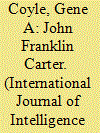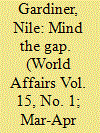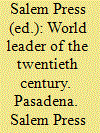| Srl | Item |
| 1 |
ID:
104253


|
|
|
| 2 |
ID:
103110


|
|
|
| 3 |
ID:
114167


|
|
|
|
|
| Publication |
2012.
|
| Summary/Abstract |
The Advisory Committee on Problems of Foreign Relations (ACPFR) of Franklin D. Roosevelt's State Department first met in late December 1939 and operated until early Summer 1940. Its previously overlooked deliberations, chaired by the dynamic Under-Secretary of State Sumner Welles, are important in three related areas. First, the ACPFR was an early marker of the Administration's later post-war planning, notably the Advisory Committee on Postwar Foreign Policy. Second, a remarkable swath of issues were discussed surrounding the ongoing conflict, prospects for its end, and the shape of the post-war world, particularly regarding Europe and the consequences of a German victory. The third area of ACPFR importance is in illuminating our understanding of the Roosevelt Administration's thinking on the conflict during the complex atmosphere of the Phoney War. The analysis concludes that although the fruits of Committee's effort would be indirect, they were nonetheless important in later post-war planning efforts that contemplated a breadth of options for the post-war world before American lives were put in harm's way.
|
|
|
|
|
|
|
|
|
|
|
|
|
|
|
|
| 4 |
ID:
113132


|
|
|
|
|
| Publication |
2012.
|
| Summary/Abstract |
IN OUR common narrative, the modern era of global finance-what we call the Old Order-begins with the Great Depression and New Deal of the 1930s. The economic model put in place by President Franklin D. Roosevelt and others at the end of World War II is seen as a political as well as economic break point. But arbitrarily selected demarcation points in any human timeline can be misleading. The purpose of narrative, after all, is to simplify the complex and, over time, to remake the past in today's terms. As we approach any discussion of the Old Order, we must acknowledge that the image of intelligent design in public policy is largely an illusion.
|
|
|
|
|
|
|
|
|
|
|
|
|
|
|
|
| 5 |
ID:
047125


|
|
|
|
|
| Publication |
Pasadena, Salem Press INC, 2000.
|
| Description |
2v. (xx, 419-838p.)Hbk
|
| Series |
Magill's Choice
|
| Contents |
Vol. II.: William Lyon Mackenzie King-Boris Yeltsin
|
| Standard Number |
0893563374
|
|
|
|
|
|
|
|
|
|
|
|
Copies: C:1/I:0,R:0,Q:0
Circulation
| Accession# | Call# | Current Location | Status | Policy | Location |
| 044333 | 920/SAL 044333 | Main | On Shelf | General | |
|
|
|
|